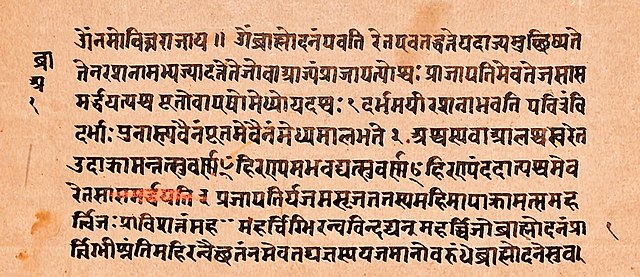BALLANTINE MASTERED MARATHI TO PREACH CHRIST IN INDIA

[Above: Sanskrit text written in the Devanagari script which is also used by the Marathi language. Ms Sarah Welch / [CC-BY-SA 4.0] Wikimedia File:13th-century Shatapatha Brahmana 14th Khanda Prapathaka 3-4, page 1 front, Sanskrit, Devanagari script.jpg]
IN ITS OBITUARY of him, the Missionary Herald asserted that Henry Ballantine preferred above all else to speak of the love of God as manifested in Christ. Once after he had preached from the text, “The blood of Jesus Christ, his son, cleanses us from all sin,” a man of eighty approached, leaning on a staff, and asked, “Is that true? Does it cleanse from all sin?”
“Yes, from all sin,” replied Ballantine, who spoke the local Indian language well.
“But suppose one has killed several men, as I did when I was a gang-robber?”
“The blood of Christ can cleanse even such as you,” replied the missionary, and the old murderer soon became a Christian.
Left an orphan in 1822 at ten years of age, Ballantine pressed hard to achieve the best education he could and became at teacher while still in his teens. He also became a convert to Christianity and immediately determined to serve the Lord. Thus it happened that in 1835 he and his young bride sailed for India.
Appointed to Ahmednuggur, he quickly mastered the Marathi language. Among his many labors was to correct the Bible translation in that tongue. He also translated hymns into his adopted language and compiled two hymnals, one for adults, the other for children. He produced other literature in the Marathi language, championed education, and trained local pastors so that the Indian churches could function independently of westerners.
But he considered preaching to be his foremost task and addressed formal church settings on Sundays and spread the gospel message in the streets and at rest homes on weekdays. So great was his desire to disseminate the hope of Christ that, any time he could, he joined tours to preach in surrounding villages.
However, his health was poor and India’s climate aggravated his weakness. In the early 1850s he found it necessary to recuperate in the cooler temperatures of the United States for two and a half years.
That lengthy rest enabled him to function for twelve years more in India. At the end, his health became so precarious doctors urged him to sail for home in 1865. Unwilling to quit the work, he tried several times to rally, but could not regain his strength. “The Lord does not count me worthy to labor any longer for him in my beloved field,” he lamented.
Sailing home, he consulted a doctor in Cairo, Egypt, who ratified the counsel of his India doctors. However, the declining missionary never reached home. Ballantine died at sea on this day 9 November 1865 as his ship neared Portugal. Among his last words were, “How sweet it is to leave all with Jesus. In Him is all my trust. He will not forsake me.”
—Dan Graves
----- ----- -----
For more about faith in India, read Christian History #87, India: A Faith of Many Colors






